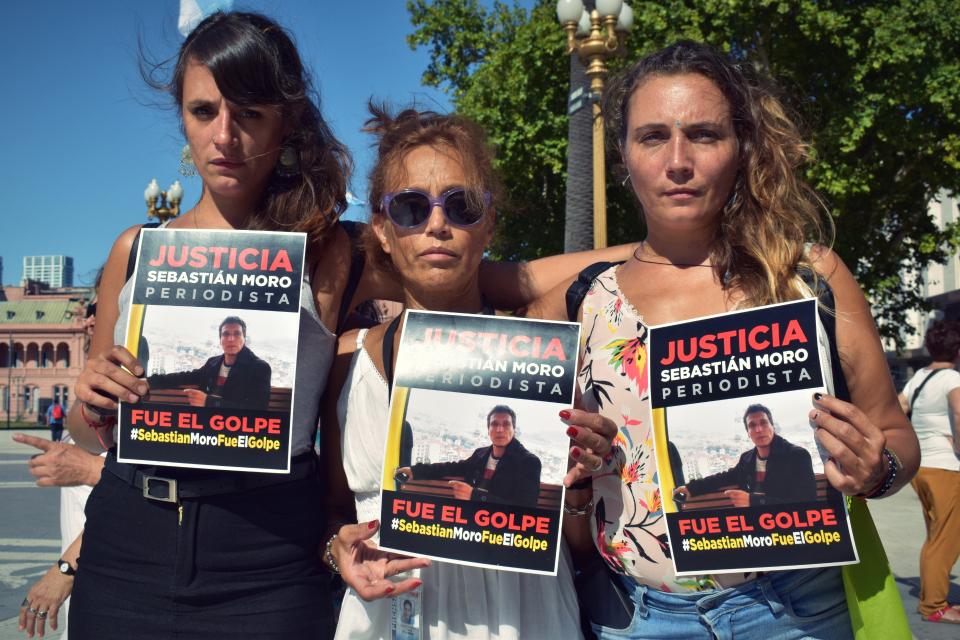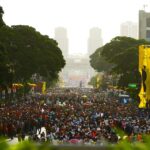
The death of Sebastián Moro, the journalist who warned of the coming coup in Bolivia, and died in unclear circumstances
By Claudia Korol – February 28, 2020
On November 16, six days after the taking of the Palacio quemado in La Paz, a contributor to Página12 (among others he worked for) died. His mother and his sisters march for him under the slogan #SebastiánMoroFueElGolpe and insist that the case be investigated, since his body bore signs of having been tortured.
“Uncle Sebi is everywhere. In the air, in the water, in the tree, here next to us … ”. Sabina is nine years old, and is the niece of Sebastián Moro, an Argentine journalist who died in Bolivia, in circumstances that have not yet been properly investigated, but there is no doubt that they are related to the violence with which the coup d’etat was prepared – he was anticipating crimes against journalists, and the forced silencing of the media. Sabina is the smallest of a group of women, sisters and mother of Sebastián, who today conduct the protest of the coup d’etat in Bolivia, and of the crime perpetrated against her son, uncle and brother, and also against all the victims of Bolivia’s racist, fascist and patriarchal dictatorship. Women in the streets, demanding justice, they are part of the path that so many other fighters, rebels, of Abya Yala have traveled. They shake hands, shout, carry Sebastian’s picture very close to the heart, cry, hurt, walk, ask, hug . . . without ever losing their tenderness.
Raquel, the mother, Melody and Penelope, the sisters, march next to Norita Cortiñas in the round of the Mothers of the Plaza de Mayo. They are accompanied by Miriam Medina, mother of Sebastián Bordón, and other mothers of victims of institutional violence. Women who never stopped walking, like so many, in these territories of violence, pain and anger. “Their strength teaches us a lot,” says Melody. “Several have advised us how to continue in this investigation. They help us to know that we are not alone, that there are other mothers, sisters, brothers, accompanying us.”
RELATED CONTENT: The Death of Journalist Sebastián Moro: “He is a Victim of the Coup in Bolivia”
There is a certain disbelief, however, in the expression of Sebastian’s sisters and mother, when they were put into a place they know well, because they have all accompanied other victims of institutional violence or dictatorship at other times, but that today has them as the protagonist (Sebastian was one of the journalists who worked rigorously on reporting the trials about the genocide in Mendoza, before leaving for Bolivia).
Thousands of women have to go through that place of protagonists, and they have become giants in the search for justice, in the very hard trade of transforming pain into struggle. However, each pain is unique. [These women] know that relationship of the general, of the historical, and of the personal devastation that they have to overcome. This was precisely the play directed by Melody, “Uter”, who adapted texts by Federico García Lorca, took to the stage life stories of three women, Miriam Medina (Mothers in Struggle), Alicia Peña (former political prisoner) and Carolina Jacky (transgender lawyer specializing in gender violence). “The play talks about feminine power,” says Melody. We had suggested that women mobilize the masses, stand in the fore, and claim their rights. Seeing my mother in the place of the woman who lost her son, was very shocking and I said: here it is. The feminine force can do everything, but it is costly.”
After the round, Norita invites them to speak. They breathe deeply. There is a ritual that continues, clenching of teeth and letting tears escape. Raquel says: “I am the mother of Sebastián Moro, a journalist. He worked for more than a long year in the weekly newspaper “Prensa Rural”, and in Radio Comunidad, two media outlets of the CSUTCB (Single Trade Union Confederation of Peasant Workers of Bolivia). Radio Comunidad was on the air until November 10, and was later hacked and dismantled. Rural Press came out on Sundays, and was distributed among peasants. Hence the recognition of many brothers and sisters, who in meetings we had came to hug us and tell us that they cried for their victims and among them was Sebastian. One of the women who had met him, hugging us, told us in Aymara: “Sebastian was our hero”.
In the days that followed the elections, Sebastian anticipated that a coup d’etat was in progress. Penelope recalls: “Sebastian was denouncing to the world the coup that was being perpetrated from the elections, or perhaps before. When he arrived in Bolivia, at the beginning of 2018, he took a turn in his journalistic life, and he became involved with the Bolivian reality in the pluricultural, the peasant, indigenous issues. However, he ended his life by communicating once more about a coup d’etat. To this day, there are intellectuals who seem to not want to understand that what happened in Bolivia was a coup d’etat that installed a dictatorship. Sebastian anticipated it. That is why in those hours before the coup he was doubly under fire, because he was reporting for locals, for Bolivia, but also for international audiences -with his work in Pagina|12 and his solidarity collaboration with other outlets in Mendoza, Colombia and Buenos Aires.
On November 10 the family lost contact with Sebastián. At their request, an acquaintance went to his house, and found him in a state of semi-consciousness. He was rushed to the hospital. Penelope arrived within hours, and two days later Raquel and Melody arrived. Sebastian was in intensive care, fighting for his life. Penelope tells us: “When I found him in the clinic, I saw marks on his body. I took pictures. I asked the doctors if these marks had to do with the diagnosis of stroke. Many told me they were marks of aggression.” The situation was desperate. Melody says: “We were all three alone, quite unprotected. We did not receive information as to what had to be done. In La Paz there was no fuel to move, we had no medication, we could not take a taxi, there was no banking activity, we couldn’t exchange currencies.”
In addition to the blows that both Penelope and the doctors who treated him at the clinic saw, his journalist jacket, his recorder, and his notebook, elements that he would not part with, were never found.
As they investigate, they contain themselves, each one grieving her own grief. Melody dreams: “I just want to go back in time, to have gone to look for him before. We had many joint projects. Our life collapsed forever . . . We have a very long task that is to remember all the work he left, like the great universal historians. ”
Raquel adds her mother’s memory: “I avoid remembering the adult teenager, looking sad, worried, always looking intensely for a place to deploy, always committed to the [struggle of others] to make it his own. Then I remember him happily in his childhood, with his sisters, with Melody, with Penelope, loving his grandmother Rosa, an unconditional companion in school. Happy child. I told them rigorously: ‘you have to be united, because I may not be here.’ His father dies very young, at 42, a fundamental man and father in the consciousness of each of them. Sebastian loved with passion and loving with passion hurts. Sebastian was fragile, intense, imperfect, loyal. I hug him and see him walking, always walking with a scarf. He used them for a long time. His notebook and pen were never missing. Write, write, write and never shut up.”
Later, closer, he deployed intensely. He left, a beautiful sunny day, with the postcard he would have chosen. The window in front of him showed El Alto, with that culture that had caught him. And the smooth passage of the cable car, in tune with his departure. “Sebastian was a walker. He walked, he walked. I don’t know why, but he always walked up. And he was a people’s journalist. He was very happy in that period in Bolivia, and we with him. It’s amazing what, in such a short time, he could do, I think he realized it, but he didn’t have time to enjoy it, we are sure that every step he took there, he chose it, and he was very happy in that Plurinational State, where he was planning on staying and giving everything, because he was forever a daily activist. ”
Translated by JRE/EF
| Website





